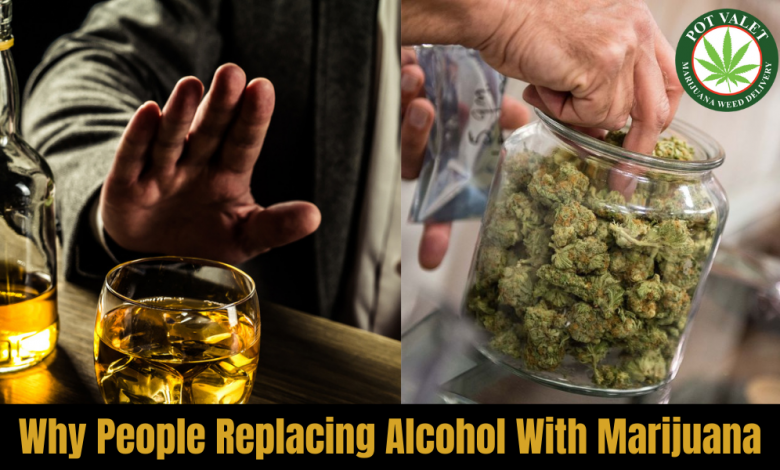Why People Replacing Alcohol with Marijuana

As public concern over the epidemic grew, so did sales of alcohol and marijuana throughout the nation. That is not all that shocking, given the availability of weed delivery services all over the states. One aspect of this trend worth noting is that individuals increasingly prefer marijuana over alcohol by significant percentages.
Although abstinence is the healthiest option, marijuana is arguably the least harmful if you must indulge. However, drawing that analogy is difficult. Cannabis has received much less study. Based on the information available, marijuana seems safer in terms of physical and mental health, addiction, and family life. “Alcohol is a potentially lethal drug. Period.” says Meenakshi Subbaraman, the Alcohol Research Group’s head of statistics and data services.
Physical Health Effects of Marijuana and Alcohol
Weed is the apparent winner in terms of physical health. In the short run, alcohol is more likely to leave you feeling worse the next day than marijuana. According to Healthline, alcohol may raise the risk of many kinds of diseases such as:
- Liver disease or hepatitis
- Cancer
- Pancreatitis
- Damage to the heart
- Stomach and gastrointestinal problems
- Damage to the central nervous system
- Erectile dysfunction (ED)
- Infertility
Marijuana’s bodily effects differ depending on how you use it. Smoking has more significant adverse health effects than, for example, eating marijuana brownies. Smoking marijuana may harm your lungs and increase your chances of getting a cough or bronchitis. Several studies have shown a connection between marijuana smoking and cardiac problems, although it is unclear if this is due to cannabis or smoking.
Marijuana and Alcohol’s Effects on Mental Health
When it comes to the brain and mental health, comparing the dangers of alcohol and marijuana becomes more complicated. The apparent concern is addiction. In the United States, more than 14 million people fulfilled the criteria for alcohol use disorder, often known as alcoholism. In 2015, approximately four million people had marijuana use disorder. However, the terminology around marijuana and addiction is hazy, and not everyone who has a marijuana use problem has an addiction.
Because more individuals consume alcohol than smoke marijuana, the earlier figures do not provide a complete picture. Instead, specialists assess the likelihood of each drug causing addiction. Many individuals who smoke marijuana do not believe it is addictive; however, the Centers for Disease Control and Prevention estimates that 10% of those who try it develop an addiction. Cannabis addiction, on the other hand, is less of a problem. “Alcohol has a greater potential for addiction,” Subbaraman adds.
Some specialists suggest that individuals who are addicted to alcohol switch to marijuana as a replacement. In the other direction, however, this is not the case. Subbaraman adds, “I have never heard anybody propose that alcohol might be a replacement medicine for another substance.”
Drinking, particularly excessive or long-term drinking, may wreak havoc on the brain, causing learning and memory issues and increasing the risk of anxiety and melancholy. Wernicke-Korsakoff syndrome, a neurological disease characterized by forgetfulness, disorientation, and hallucinations, may be caused by excessive drinking. Although alcohol may cause direct damage to brain cells, most cognitive deficits are reversible after a year of abstinence.
Marijuana and Alcohol’s Effects on Mortality
Overdosing is a danger if you are hitting the bottle hard. Are you squeezing the vape pen a lot? Not at all. According to the American Addiction Centers, alcohol kills 90,000 individuals each year, whereas marijuana kills almost none. You would have to consume between 250 and 1,115 joints in one day to obtain a fatal dosage of THC, marijuana’s primary euphoric ingredient.
According to a 2014 research, 1.5 million individuals died globally in 2010 from alcohol-related cancer and liver cirrhosis. Men accounted for almost 1.2 million of the fatalities. However, how much you drink is essential. According to the research of over 330,000 individuals, light and moderate drinking reduce the risk of death from all causes, while excessive alcohol raises the chance of all-cause mortality. (Although this is extensive research, long-term mortality for moderate alcohol use is difficult to nail down, and several high-quality studies contradict this result.)
Some individuals opt to replace marijuana with alcohol when attempting to quit drinking, a controversial technique known as marijuana maintenance.
Those in favor of marijuana users claim that it is much less harmful to one’s health than alcohol. Those who criticize the practice say that if a person substitutes one mind-altering substance with another, the objectives of sobriety are never really attained.
Marijuana Management’s Potential Benefits
Supporters of marijuana management programs quickly point out that the data for conventional recovery programs such as Alcoholics Anonymous (AA) is mixed.
A Cochrane review of studies published in 2006 found no significant difference in the outcomes obtained by individuals in AA compared to alternative treatment approaches.
The failure rate was significant for individuals who were unable or unwilling to attend AA meetings regularly. Proponents say that it is these people who might benefit from marijuana management. Abstinence-based regimens are unrealistic and unattainable for specific individuals, according to the model.
Marijuana management advocates often claim that there is a stigma on the substance. Those who support marijuana usage say that, unlike alcohol, you may take it without the danger of death from binge drinking. They further point out that it has fewer medication interactions than alcohol and, thus, may have a lower long-term health effect.
Furthermore, proponents believe that marijuana may have certain intrinsic advantages over alcohol. While there is still disagreement over whether moderate drinking provides health advantages, the consequences of alcohol abuse may be disastrous, increasing the chance of breast cancer, birth abnormalities, and other diseases.
Marijuana, on the other hand, is said to have certain health advantages, making it helpful in specific circumstances. Marijuana, for example, is often used to relieve pain, increase hunger, and improve depression. These characteristics may be beneficial to someone suffering from an alcohol use problem.
According to the findings of a Harris Poll published this month, almost half of cannabis users aged 21 and above have replaced or decreased their alcohol usage with weed since the coronavirus epidemic began. One-third of people who use cannabis recreationally prefer it over drinking alcohol, according to the survey.
Since the Covid-19 epidemic, almost 2,000 people aged 21 and above were questioned about their usage patterns. Forty-two percent of individuals who claimed they had ever used cannabis said they had begun or increased their usage during the epidemic.
While there are drawbacks to smoking marijuana, they pale compared to the issues with drinking alcohol. Just keep in mind that you should do everything in moderation, and smoking every day is almost sure to screw you up in the long term — although without the nasty hangover. If you use marijuana delivery in West Hollywood for medicinal purposes, always consult your medical provider.




